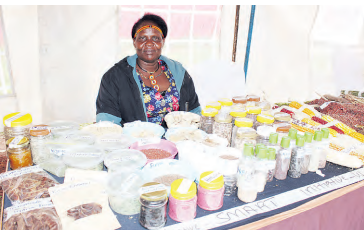

In November 2024, Evalyne Laipon travelled hundreds of kilometres from West Pokot to Nyeri town to exhibit a variety of traditional crops indigenous to her county.
Laipon, a member of Smart Initiative that promotes agroecology, trains farmers to preserve traditional seeds in airtight containers.
She told the Star traditional crops sustained communities decades ago and kept them disease-free.
“Our ancestors fed on these crops and would live for many years. Diseases were not many. These crops are what we should be feeding on,” Laipon said.
Among the seeds she displayed in the traditional seeds festival were the oyster nuts that grow in West Pokot and surrounding areas.
The crop is native to East and Central Africa. The nutritious nut is derived from oyster nut crop, a vine that grows up to 30 metres long and which produces huge gourd-like fruits with many seeds.
Though the fruit is edible, the crop is famed for its seeds that are 30 per cent protein and more than 60 per cent oil.
When eaten raw, roasted, pickled or boiled, the oyster nuts present a flavour similar to that of hazelnut or almond.
The Chagga community in Tanzania believes they help new mothers regain their strength faster and stimulate milk production in lactating mothers.
The seeds are pressed for oil that can be used for cooking and production of cosmetics and soaps. The leftovers are used as livestock fodder.
“These oil can be used in food seasoning and can be applied on the skin. They are also a good source of omega-3 that is crucial for joint, heart, mental health,” Laipon said.
She is one of the numerous farmers countrywide fighting for seeds sovereignty, especially among small-scale farmers.
In 2022, smallholder farmers filed a case in court over the Seeds and Plant Varieties Act, 2012, that criminalises sharing, exchanging or selling of uncertified and unregistered seeds.
Under the law, offenders attract a jail-term of up to two years or a fine of up to Sh1,000,000, or both and provides for the appointment of seed inspectors, seed analysts and plant examiners.
The officers, upon producing their identification, are allowed access to any place or premises in which they believe an uncertified and unregistered seed material has been processed, stored or used.
Farmers have complained that such laws have allowed corporate control on seeds and the food system.
According to Food and Agriculture Organization of the United Nations, farmer managed seed systems are the cornerstone of a bio-diverse, climate-resilient, equitable food system and are essential to achieving food security.
But FAO says modernisation of food systems has undermined seed diversity through corporate and governmental policies that support seed homogenisation and privatisation.
Despite more than 6,000 plant species being cultivated for food worldwide, FAO says only nine accounts for the majority of total crop production.
It cites the International Union for the Protection of New Varieties of Plants (UPOV) established by the International Convention for the Protection of New Varieties of Plants that was adopted in Paris in 1961 and revised in 1991.
The convention that is based in Geneva, Switzerland, aims at encouraging innovation and research in agriculture and allows breeders the exclusive right to use their registered material to ensure they recover their investment after the development of plants and seeds.
“We all pay the cost. The right to food sovereignty is undermined around the world. Proprietary seeds leave farmers in debt and consumers are hurt when food supplies rely on fewer crops vulnerable to droughts, floods and pests,” FAO says.
Globally, there are more than 1,750
seed banks that preserve more than
seven million seed samples, cuttings
or genetic material in cold storage,
living plants grown in open field seed
banks, DNA, embryos, or pollen samples stored in test tubes.

